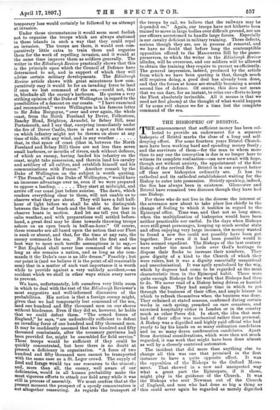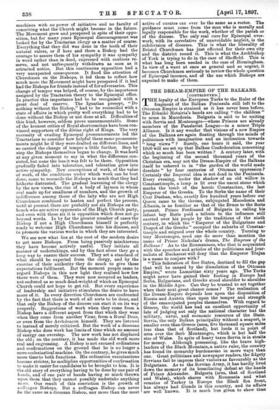THE BISHOPRIC OF BRISTOL.
announcement that sufficient money has been col- lected to provide an endowment for a separate bishopric of Bristol marks the close of a long and self- denying effort. For some fourteen years Bristol Church- men have been working hard and spending money freely and the survivors of them—for the man to whom more than to any one the conception is due is no longer here to- witness its complete realisation—can now await with hope. though not without anxiety, the appointment of the first Bishop of the revived See. Bristol is in one respect better off than new bishoprics ordinarily are. It has its- cathedral and its cathedral establishment waiting for the- Bishop to enter into possession. Strictly speaking, indeed, the See has always been in existence. Gloucester and' Bristol have remained two dioceses though they have had one Bishop.
For those who do not live in the diocese the interest of the severance now about to take place lies chiefly in the change of feeling to which it testifies in regard to the- Episcopal office. Time was, and that not so long since,. when the multiplication of bishoprics would have been neither practicable nor useful. In the days when Bishops were still great personages, keeping up much secular state and often enjoying very large incomes, the money wanted' to found a new See could not possibly have been got together. Nor even if it had been possible would it have seemed expedient. The Bishops of the last century were rather too much lords over God's heritage to dispose their flocks to increase their numbers. They gave dignity of a kind to the Church of which they were rulers, but it was a dignity essentially unspiritual and unecelesiastical. It was aptly symbolised by the wig, which by degrees had come to be regarded as the most, characteristic item in the Episcopal habit. There were quite enough Bishops for the work that Bishops had then to do. We never read of a Bishop being driven or hurried, in those days. They had ample time in which to get through the business of their office, and ample leisure in which to refresh themselves when the business was done. They ordained at stated seasons, confirmed during certain weeks in each spring, preached on rare occasions, and exercised hospitality either in London or in the country much as other Peers did. In short, the idea that men had of their office was mechanical rather than personal. A Bishop was a dignified and highly paid official who had yearly to lay his hands on so many ordination candidates and on so many dozen confirmation candidates. Apart from doctrinal considerations, which were then not much regarded, it was work that might have been done almost as well by a cleverly contrived automaton. The incident that did more than anything else to change all this was one that promised in the first instance to have a quite opposite effect. It was the opposition of the Bishops to the Oxford Move- ment. That showed in a new and unexpected way what a great part the Episcopate, if it chose, might play in the guidance of the Church. It was the Bishops who sent Newman out of the Church of England, and men who had done so big a thing as this could never again be regarded as merely dignified machines with no power of initiative and no faculty of conceiving what the Church might become in the future. The Movement grew and prospered in spite of their oppo- sition, but for many years Episcopal discouragement was looked for by the Tractarian clergy as a matter of course. Everything that they did was done in the teeth of their natural rulers, or if here and there a Bishop had the courage to assure them of his sympathy it was sympathy in word rather than in deed, expressed with cautious re- serve, and not unfrequently withdrawn as soon as it attracted notice. But this continuous opposition had a very unexpected consequence. It fixed the attention of Churchmen on the Bishops, it led them to reflect how much more the Movement might have prospered if it had had the Bishops for friends instead of for adversaries. This change of temper was helped, of course, by the importance assigned by the Tractarian theory to the Episcopal office. In practice this importance had to be recognised with a great deal of reserve. The Ignatian precept, "Do nothing without the Bishop," had to be reconciled with a state of affairs in which pretty well everything had to be done without the Bishop or not done at all. Difficulties of this kind, however, seldom prove unsurmountable. Some of the keenest critics of Royal shortcomings have been con- vinced supporters of the divine right of Kings. The very necessity of evading Episcopal pronouncements led the Tractarians to consider how helpful these same pronounce- ments might be if they were drafted on different lines, and so carried the change of temper a little further. Step by step the Bishops themselves began to change. It was hard at any given moment to say in what the difference con- sisted, but none the less it was felt to be there. Opposition gradually faded into toleration, and toleration grew into active sympathy. New conceptions of work, of the value of work, of the conditions under which work can be best done, came to reconcile the Bishops to much that they had hitherto distrusted. The gradual leavening of the clergy by the new views, the rise of a body of laymen in whom zeal made up for smallness of numbers, and the growth of indifference among those of the laity who are not High Churchmen combined to hasten and perfect the process, until at present there are probably not six Bishops on the bench who are active opponents of the High Church party, and even with these six it is opposition which does not go beyond words. In by far the greater number of cases the Bishop if not a High Churchman himself is perfectly ready to welcome High Churchmen into his diocese, and to promote the various works in which they are interested.
We see now what lies at the root of the modern desire to get more Bishops. From being passively mischievous they have become actively useful. They initiate all manner of undertakings, and by this fact alone they go a long way to ensure their success. They set a standard of what should be expected from the clergy, and by the exercise of their authority they do much to give these expectations fulfilment. But the moment people came to regard Bishops in this new light they realised how few there were of them. They were now accepted as leaders, not endured as so much dead-weight of which an Episcopal Church could not hope to get rid. But every experience of leadership and initiative stimulates the desire to have more of it. In every direction Churchmen are confronted by the fact that there is work of all sorts to be done, and that only the Bishop of the diocese can start it on its way properly. Suggestions of work when they come from a Bishop have a different aspect from that which they wear when they come from another Vicar, from a Rural Dean, or even from the Archdeacon himself. They are listened to instead of merely criticised. But the work of a diocesan Bishop who does work has limits of time which no amount of energy can overstep. The new work has not displaced the old; on the contrary, it has made the old work more real and engrossing. A Bishop is not excused ordinations and confirmations on the ground that he is no longer a mere ecclesiastical machine. On the contrary, he gives much more time to both functions. His ordination examinations become stricter, he multiplies opportunities of confirmation to make it easier for candidates to be brought to him. It is the old story of everything having to be done by one pair of hands, and of one pair of hands having so much thrown upon them that they cannot possibly undertake anything more. One result of this conviction is the growth of suffragan Bishops. But a suffragan Bishop can never be the same as a diocesan Bishop, any more than the most active of curates can ever be the same as a rector. The guidance must come from the man who is morally and legally responsible for the work, whether of the parish or of the diocese. The only real cure for Episcopal over- work, with its correlative of unavoidable neglect, is the subdivision of dioceses. This is what the liberality of Bristol Churchmen has just effected for their own city and the district round it. This is what the Archbishop of York is trying to do in the case of Sheffield. This is what has long been needed in the case of Birmingham. In view of a want at once so general and so urgent, it becomes Churchmen seriously to review the whole question of Episcopal incomes, and of the use which Bishops are expected to make of them.



































 Previous page
Previous page